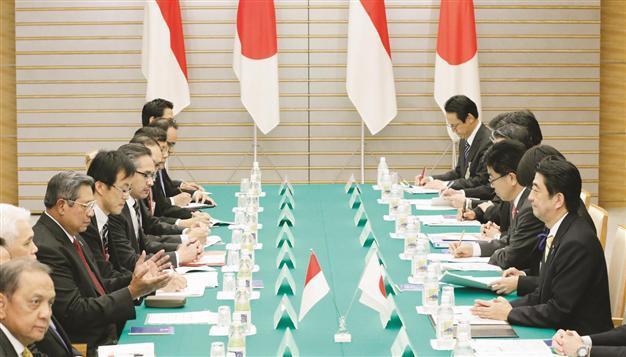Japan in currency contracts with three Asian countries
TOKYO - Agence France-Presse

Indonesian President Susilo Bambang Yudhoyono (3rd L) talks with Japanese Prime Minister Shinzo Abe (R) at the latter’s official residence in Tokyo to strengthen economic ties. AFP photo
Japan has expanded currency swap agreements with Indonesia and the Philippines, officials said on Dec. 13, as Tokyo looks to bolster regional relations to counter the growing influence of China.
The deals - along with the renewal of an expired agreement with Singapore - came as Tokyo hosted a special three-day summit with leaders from the Association of Southeast Asian Nations (ASEAN) to mark the 40th anniversary of ties between the sides.
Currency swaps are useful in times of economic stress, when normal foreign exchange markets can seize up, as they allow for financial authorities to buy local currencies with something much more liquid - usually the US dollar.
Since the Asian crisis in the late 1990s, Japan has spearheaded efforts to build a regional currency swap agreement, now known as the Chiang Mai Initiative (CMI), which has ballooned to about $240 billion. Japan said it has nearly doubled its bilateral swap arrangement with Jakarta to $22.76 billion from $12 billion, as concerns rumble about the possible impact of the US Federal Reserve scaling back its massive stimulus program.
The central bank, which holds a policy meeting next week, may start tapering its $85 billion-a-month bond buying scheme as early as this month.
That may drive a flight back to the dollar and stoke potentially destabilizing capital outflows in emerging markets.
Currency swap deals“The authorities in Japan and Indonesia hope that the strengthened bilateral financial cooperation will contribute to the stability of financial markets,” the Japanese finance ministry said.
Japan also agreed to boost its arrangement with the Philippines to $12 billion from $6 billion, although officials in Tokyo added that the two have yet to decide when the accord is to take effect. Separately, Tokyo and Singapore agreed to renew a combined $4.0 billion swap deal, which expired two years ago.
A recent survey showed that the 10 ASEAN countries had re-emerged as Japan Inc.’s favored investment destinations, with China falling off the top of the list for the first time in more than two decades because of higher labor costs and diplomatic tensions.
